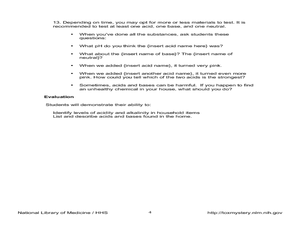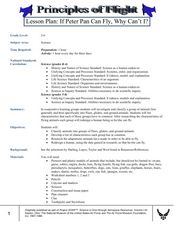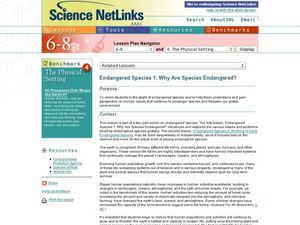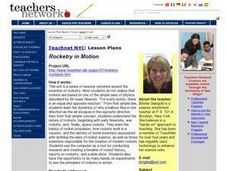Curated OER
Living in a Watershed
Fourth graders examine watersheds. In this ecosystem lesson, 4th graders discover what a watershed is and identify the local watershed they live in. Students investigate the attributes of a watershed as well.
Curated OER
Astronomy
Students examine a medieval manuscript on astronomy and create their own books based on modern discoveries in astronomy. In this astronomy lesson plan, students compare astronomy knowledge in the middle ages to today and research modern...
Curated OER
The Planets Moon
Students explore the theories of the creation of the universe and examine the properties of celestial bodies. They analyze the relationship between the sun, Earth and other planets. They discover the infinite potential of the science of...
Curated OER
Acid or Base? Toxie's on the Case
Students recognize the difference between acids and bases. In this ToxMystery instructional activity, students play a computer game and experiment to find the difference between acids and bases. Students use litmus paper to...
Curated OER
If Peter Pan Can Fly, Why Can't I?
Students redesign a human, using data in research, so that s/he can fly. In this flying instructional activity, students examine the characteristics and adaptations of groups of animals that can fly. Using this research, students...
Curated OER
DIY Lava Lamp
Young scholars examine lava lamps and what causes them to work. In this density lesson students make a lava lamp and write the scientific explanation of what happens.
Michigan Sea Grant
Fish Identification
Using a dichotomous key, pupils identify characteristics of fish who live in the Great Lakes and explain how these features help them survive. In small groups, class members discover what features scientists consider important and...
Curated OER
Elephant Seals - Evolution
Students create posters or skits based on specific adaptive characteristics of elephant seals.
Curated OER
Urban Ecosystems 4: Metabolism of Urban Ecosystems
Cities are compared to living, breathing, metabolizing organisms. Fourth in a five-part series of lessons, this one focuses on the flow of materials through a city. Links to interesting websites and images make your delivery of...
Curated OER
Endangered Species 1: Why are Species Endangered?
Emerging ecologists examine endangered species by visiting the US Environmental Protection Agency website. They consider human contribution to the decline of different species. They research an endangered animal and then craft a poster...
Curated OER
What Happened?
Students read legends about volcanoes. They develop their own legend and shares them with the class. They practice their writing skills as well.
Curated OER
Rocketry in Motion
Students investigate why a balloon flies in one direction as air escapes in the opposite direction, which helps them understand the nature of rockets and fireworks. Individually and in teams, students conduct research to create a...
Curated OER
Baga Drum
Pupils examine a Baga Drum in order to explore the history of the Baga people of West Africa. In this art history lesson, students recognize figures used in Baga Drum design that represent aspects of Baga culture. They also design and...
Curated OER
Mississippi Gulf Coast Islands
Fourth graders complete a variety of exercises as they study the creation, history, and geography of the Mississippi coastal islands. They discover the natuaral forces that act on the islands and how these forces affect the habitats and...
Curated OER
Egg Carton Coral
Students use egg cartons to construct models of coral colonies showing
many aspects of the coral's natural history - including the structure of
coral polyps and the coral colony's colonial life style.
Curated OER
Oxidation And Corrosion
Young scholars sort tarnished metals by type and experiment with different cleaning solutions and techniques to restore them to their natural color and shine.
Curated OER
From Lake to Lake
Fourth graders investigate the formation of the Great Salt Lake. They conduct research using a variety of resources. The information is used to construct a timeline of the history. Each phase of history should include facts and...
Curated OER
Strangers in Their Own Land
Students use interview techniques to explore the traditional wisdom of fishers, farmers, First Nations, and other peoples whose close relationship with nature gives them a deeper understanding of, and sensitivity toward, climatic cycles...
Curated OER
Bats Migrate South
Students examine the life of bats in Illinois. Using the internet, they research the history of the bat in Illinois and describe the way they find prey by using echolocation. They report their findings to the class and answer any...
Curated OER
Make a Rain Stick
Students create a rain stick to imitate the nature sounds in a rainforest habitat. In this rainforest habitat instructional activity, students create a rain stick to mimic the cultural tools used in the South American rainforest....
Curated OER
Blast's Cosmic Carnival
Students, after analyzing the history of a concentrator, model how a Genesis spacecraft concentrator works by playing a game. In groups of three or four, after being given materials to work with, are challenged to roll the rubber balls...
Curated OER
Why Should We Clean The Beach?
Students volunteer for the International Coastal Cleanup. They describe the purpose of the Lake Michigan Foundation and a history of the dunes. They reflect on their experiences with writing.
Curated OER
Hunt for Habitats
Learners review components of a habitat and go on a hike around a pond and woods exploring different habitats and the plants and animals that use them. They examine mammal pelts and discuss the life histories, adaptations, and positions...
Curated OER
A Sense of West Virginia
Students consider their perceptions of the world through their 5 senses while visiting the West Virginia State Museum. In this West Virginia history lesson, students discover how knowing about the past helps with their understanding of...























